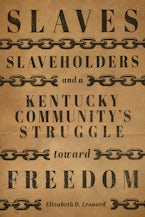Elizabeth Leonard presents an unusual and insightful account of slaveholding Unionist Joseph Holt and the enslaved people of Holt's Bottom, Kentucky. Holt's evolution from Jacksonian Democrat to wartime Judge Advocate General and emancipationist is neatly paired with the story of African Americans in Kentucky and specifically soldiers in the 118th USCT. A deeply contextualized story with great appeal for scholars and general readers alike.
~George C. Rable, author of Damn Yankees! Demonization and Defiance in the Confederate South
Elizabeth Leonard draws on her vast familiarity with Joseph Holt, his extended family, and Kentucky's slaveholding society to offer a compelling study of slavery and freedom during the Civil War era. Black military service, emancipation, struggles for equality, and the reluctance of most white Kentuckians to accept the conflict's transformative effects provide major themes in a complex story.
~Gary W. Gallagher, author of The Union War
In this eye-opening book based on impressive research, Elizabeth D. Leonard weaves together the stories of Kentucky slaveholder Joseph Holt, who as Lincoln's judge advocate general became a powerful supporter of emancipation and equal rights, and one of his former slaves, Sandy Holt, whose service as a soldier in the 118th US Colored Infantry was emblematic of the significant contributions of black troops to the same causes.
~James McPherson, author of The War that Forged a Nation: Why the Civil War Still Matters
In clear, crisp prose and drawing on remarkable micro-historical research, Leonard unveils how Joseph Holt, who served as President Abraham Lincoln's judge advocate general, evolved from a slaveholder who defended white supremacy to a staunch proponent of the Union, an opponent of the Confederacy, a defender of emancipation and the use of African American soldiers, and black Americans' freedom and rights. Sandy Holt, who fled slavery to join the 118th US Colored Troops, emerged from the war as a free man and played a role in helping to suppress the Confederate rebellion and emancipating his fellow persons of African descent. Leonard's well-argued book underscores the power of race and white supremacy in turbulent postwar Kentucky as well as the promise of change leading to the advancement of African American civil, human, and political rights. An excellent book, one that offers hope of racial reconciliation in our own day.
~John David Smith, author of Lincoln and the US Colored Troops
This is a really good book. With the eye of an intrepid researcher and the touch of a splendid story teller, Elizabeth Leonard reveals how two men named Holt—Joseph, the judge-advocate general of the United States, and Sandy, his property for twenty years—worked, each in his own way, to save the Union and abolish slavery. A marvelous blend of community and personal history that intertwines the worlds of slavery and freedom.
~Daniel Sutherland, University of Arkansas
Some time in the late 1830s Joseph Holt, a Kentucky Democrat and prominent lawyer, purchased an enslaved man from Virginia, named Sandy. Roughly a quarter century later, Holt was Abraham Lincoln's Judge Advocate General, and fully dedicated to supporting emancipation and protecting African Americans, both in and out of uniform. In the summer of 1864, Sandy Holt escaped from slavery and enlisted in Company A of the 118th United States Colored Troops. About three decades later, both men died not far from each other in Kentucky. In this fascinating short volume, Elizabeth Leonard unravels the intertwined lives of these two fascinating men. The story reveals much about race and geography in Civil War era Kentucky. Along the way, Leonard provides students and general readers with a wonderful tutorial about how to uncover the lives of the famous and anonymous, and how to tell their stories.
~Matth Gallman, University of Florida
Leonard's illuminative new book investigates the revolutionary impact brought by emancipation and black military service during the Civil War on the black and white members of the prominent Holt family of Breckinridge County, Kentucky. Her exploration both captivates and enlightens the reader in the complicated, dispiriting, but occasionally inspiring narrative of how freedom shaped the postwar American landscape.
~Joan Waugh, coauthor of The American War: A History of the Civil War Era











